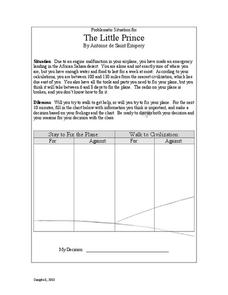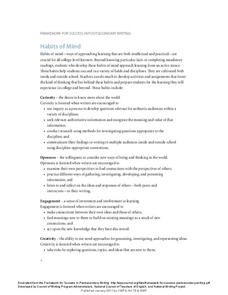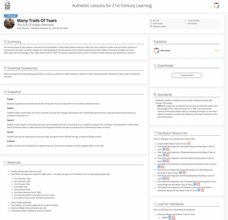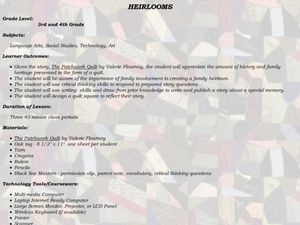Curated OER
Reading a Comparison-Contrast Essay
Turn your passive readers into active readers with an engaging lesson on reading informational text. Focused on compare and contrast structured essays, the activity prompts elementary learners to jot down questions and think-aloud...
Curated OER
The Little Prince: Problematic Situation
Your plane has crashed in the Sahara desert. What do you do? Explore the possibilities with a role-playing activity based on Antoine de Saint Éxupery's The Little Prince. In groups, kids decide whether they would walk to find help...
Curated OER
Hype!
Eight various activities have your learners looking at hype in the media. Advertisements for films, politics, music, and philanthropy all contribute to emotional appeals and marketing strategies trying to convince consumers to...
Oregon Department of Education
Habits of Mind
There is more than one way to approach a problem. Explore the habits of mind as they relate to the methods of approaching learning, and to how young writers can develop success once they learn to foster each skill.
Odell Education
Making Evidence-Based Claims: Grade 9
Sorry, Charlie. Scholars take a close look at Apology by Plato. Activities analyzing the text help pupils understand, make, organize, and write about claims. Learners work in groups, complete claim tools, and evaluate thinking by filling...
Virginia Department of Education
Exponents
Expand your knowledge of exponents with an activity that promotes critical thinking and comparison skills. Middle and high schoolers compare numbers written in expanded and exponential form and explain their strategies for solving...
University of North Carolina
Argument
What elements make up a successful argument? A helpful resource describes aspects of an argument such as the claim, evidence, counterargument, and audience. Perfect as an individual assignment for a flipped lesson or collaborative work,...
Anti-Defamation League
Dealing with the Social Pressures that Promote Online Cruelty
Why do people engage in cyberbullying? What can be done about it? These are the questions middle schoolers consider in a very timely lesson plan. Participants view PSA announcements, read a case study, and participate in scenarios...
K20 LEARN
Many Trails of Tears: The Era of Indian Removal
Cherokee, Chickasaw, Choctaw, Creek, and Seminole. All were forced off their ancestral lands in the southeastern United States as part of the Indian Removal Act of 1830. Young historians research the tribes' reactions to this removal and...
K20 LEARN
Worcester v. Georgia: Cherokee Sovereignty and Actions of the U.S. Government
Young historians study the Supreme Court case "Worcester v. Georgia" and note instances where the Justices defended the sovereign rights of the Cherokee. They also examine the actions of President Andrew Jackson and the...
K20 LEARN
Mob Mentality and "The Outsiders": Integrating Fiction and Nonfiction
S. E. Hinton's The Outsiders allows middle schoolers to reflect on mob mentality. After reading an article and watching a video about herd mentality, class members find examples in the novel of when characters go along with the...
University of Kansas
Newspaper in the Classroom
Newspapers aren't only for reading—they're for learning skills, too! A journalism unit provides three lessons each for primary, intermediate, and secondary grades. Lessons include objectives, materials, vocabulary, and procedure, and...
Indiana Department of Education
Social Emotional Toolkit
Looking for some tools to help you incorporate social and emotional learning into your curriculum? Then check out this 79-page kit packed with ideas for developing social-emotional learning competencies. The first section provides...
US Department of Education
A Close Reading of Lincoln’s Gettysburg Address
Abraham Lincoln's Gettysburg Address provides the text for a series of close reading exercises that model for instructors how carefully crafted guiding questions can help readers think critically about what they read, thus developing...
Media Education Lab
Understanding Viral Messages
Imagine advertising for a product but not being paid to do so. Welcome to the world of Viral Messaging. Class members first view a T-Mobile flash mob video that went viral and has been seen by over 14 million viewers. After analyzing the...
Curated OER
The Outsiders: Directed Reading Thinking Activity
It can be difficult to begin a novel when you don't know what it's about. Take the opportunity to begin S.E. Hinton's The Outsiders slowly, making predictions and answering questions about the book's first nine pages.
Curated OER
Pick a Pet
Learners design informational materials to educate people on the importance of matching a new pet to the family's lifestyle and living arrangements. Students use critical thinking skills to make a decision on the appropriate choice for a...
Curated OER
The Tell - Tale Heart
Students read The Tell Tale Heart and practice critical analysis while reflecting on its underlying meanings. In this reading lesson, students make predictions, monitor their own comprehension and adjust their reading accordingly....
Curated OER
Heirlooms
Students design a quilt square to reflect their special memory. In this family heirlooms lesson, students read The Patchwork Quilt and discuss the importance of family involvement in creating a family heirloom. Students write and publish...
Curated OER
Reader R.E.A.C.T.I.O.N.
Young scholars practice their reading comprehension skills. In this reading skills lesson, students use the R.E.A.C.T.I.O.N. model to identify story elements in books that young scholars elect to read independently.
Curated OER
Compare/Contrast San Francisco Transportation from the 1850s to Today
Young scholars examine the evolution of transportation systems. In this San Francisco history lesson, students compare and contrast the transportation provided in the city in the 1850s to today. Young scholars use their findings to...
PBS
Facts vs. Opinions vs. Informed Opinions and their Role in Journalism
Do reporters write about what they see, or what they think? Examine the differences between investigative writing and opinion writing with a activity from PBS. Learners look over different examples of each kind of reporting, and convince...
Scholastic
Look for Easy Numbers for E-Z Addition
All kids learn differently. For some, mental math is the best and most efficient way to add a series of numbers. After viewing a few sample problems, learners find ways to add numbers to 10 before adding them all together, and then write...
C-SPAN
Why Do Americans Not Vote in Elections?
In an age of inflamed politics, who votes, who doesn't vote, and why are the questions everyone is trying to answer. Pupils listen to scholars, journalists and data crunchers on voting statistics to make their own conclusions. A chart...

























